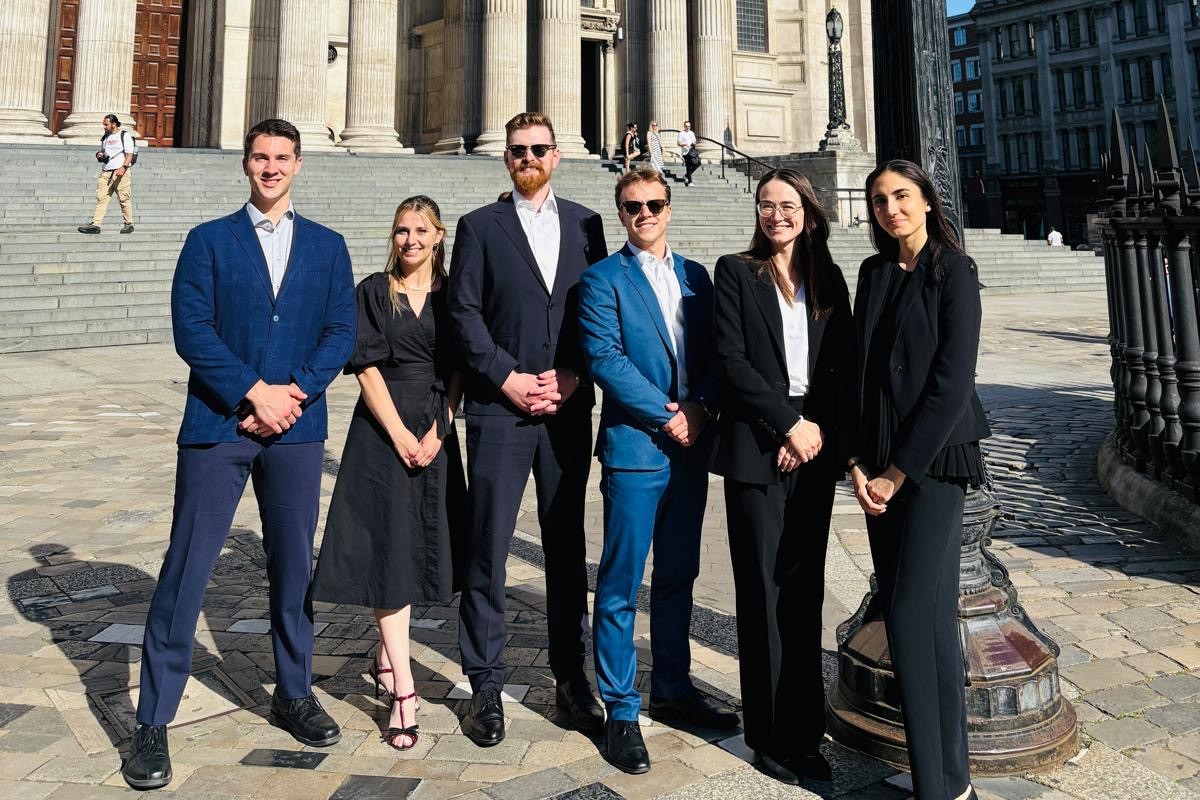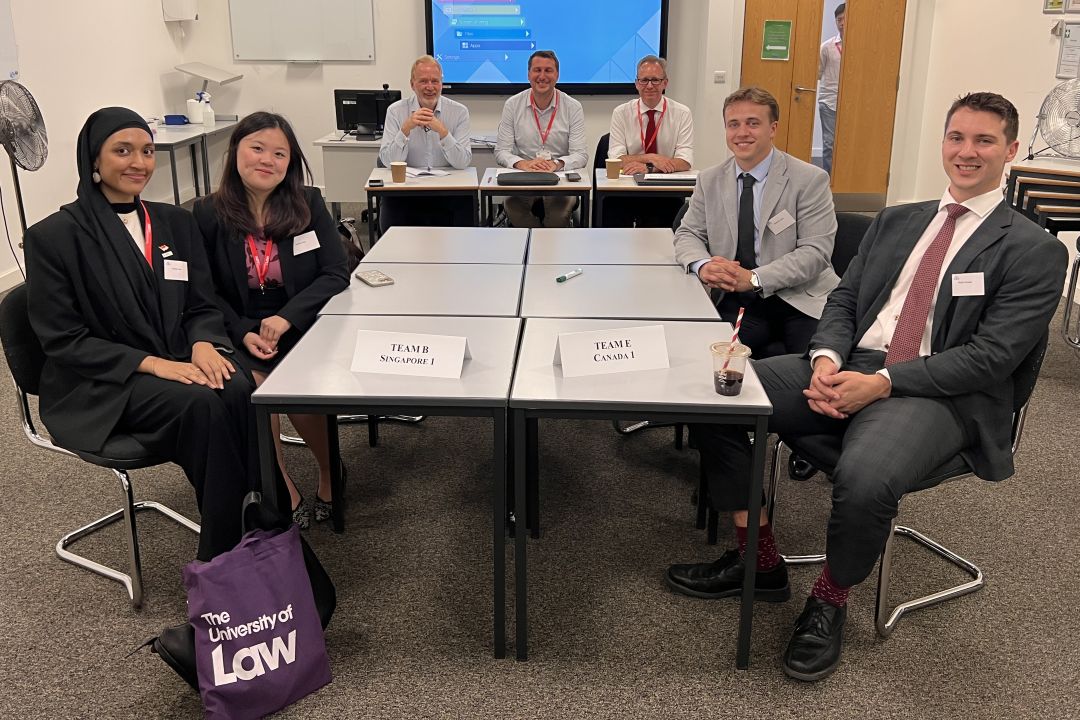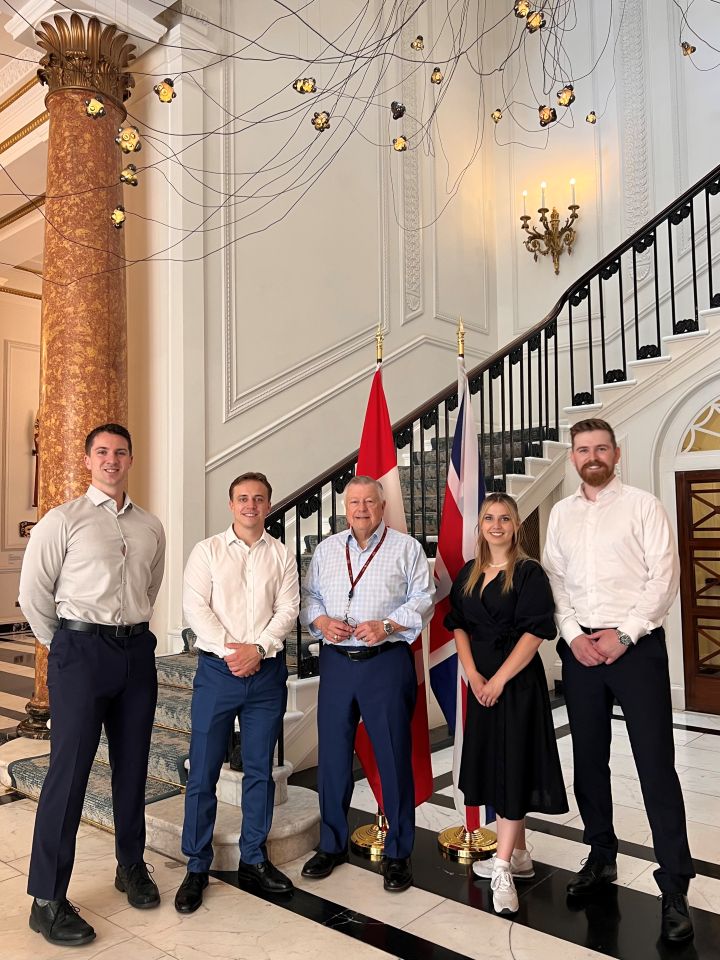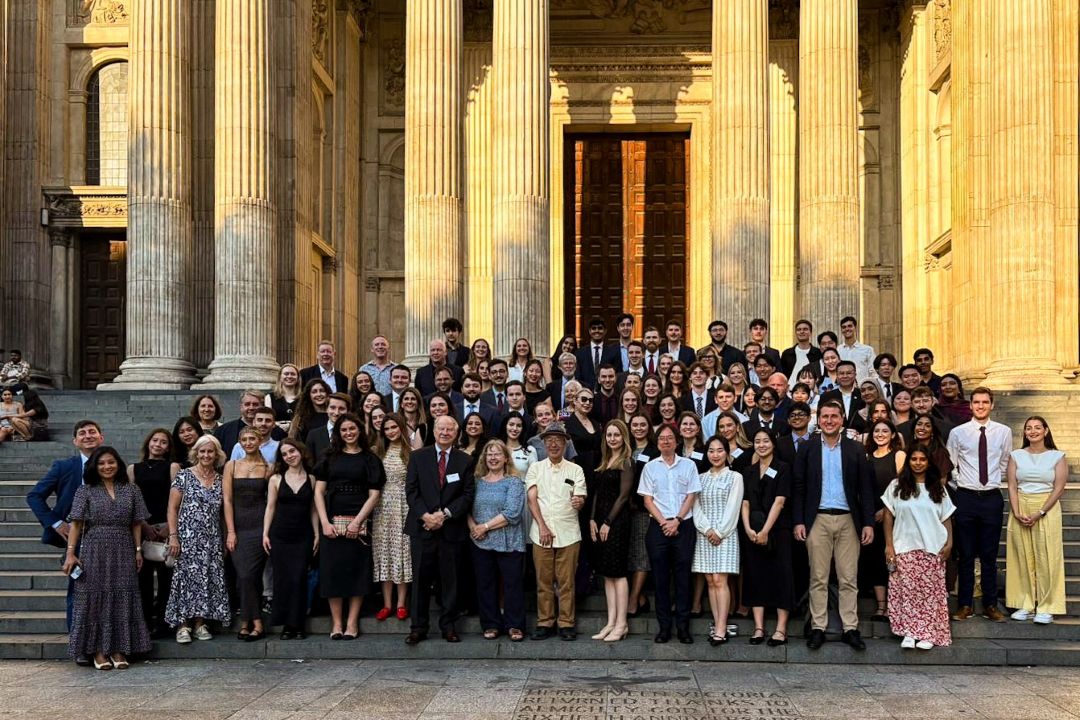
USask Law represents Canada at International Negotiation Competition
The teammates attended the international event after finishing first and second at the Canadian National Negotiation Competition in March 2025.
By Brandon JohnsonThe prestigious International Negotiation Competition (INC) was held in London, England from July 7-12. Canada was represented by teams from the University of Saskatchewan College of Law (Team Canada 1) and the McGill University Faculty of Law (Team Canada 2).
USask Law’s Brandon Johnson (JD Candidate 2026) attended as an alternate and provided this report about his experience.
USask Law’s International Negotiation Competition (INC) team joined participants hailing from 18 countries across four continents in a week-long event that blended legal reasoning, diplomacy, and cross-cultural collaboration.
The day after arriving in London, the team had the honour of participating in a Negotiation Masterclass Symposium hosted by A&O Shearman, one of the top-ranked law firms in the world. The day included sessions with corporate dealmakers, hostage negotiators, and even advisors to Nelson Mandela during the apartheid era in South Africa.
USask team has strong showing
Michael Letts (JD Candidate 2026) and Mark Wonko (JD 2025) served as the negotiators for Team Canada 1, earning the right to represent Canada after winning the Canadian National Negotiation Competition (CNNC) in March in Windsor, Ont. Sarah Hoag (JD Candidate 2026) and I attended as alternates and support for Team Canada 1 and 2 after finishing second to Michael and Mark at the CNNC.
Team Canada 1 performed strongly, winning three of four rounds, including negotiations against teams from Australia, Singapore, and Brazil. Their final round was a multi-party labour negotiation against Germany and New Zealand.
The competition scenario was a fictional but realistic commercial aviation dispute that evolved over four rounds. In each, teams navigated challenges ranging from startup funding to litigation arising from airport closures, boardroom power struggles, and contentious union negotiations. Judges evaluated each negotiation on tone, teamwork, legal analysis, and cultural fluency.

Alternates provide valuable insight to competing teams
While Sarah and I were not called to negotiate, our roles as alternates felt anything but passive. The opportunity to observe rounds, debriefs, and judges’ feedback was a unique peek behind the curtain to the entire process of a negotiation from both sides. I learned how to break down a negotiation from a coaching perspective and decide whether the moment called for technical advice or a morale boost. Because I would almost always have more feedback than what was necessary to share, I found the real skill was choosing when to highlight a single point to move the team forward or deciding when silence, a grin, or a well‑timed joke would do the job even better.
Team Canada 2 was composed of McGill students Sarah Despatie and Anna Sas, who won the French-language stream of the CNNC and ultimately placed fifth overall at the INC. Sarah Hoag generously stepped into a mentorship role for McGill’s team, attending their rounds and offering guidance throughout the week.
Team Canada 2 was very grateful to have Sarah’s support as their coaches were unable to attend due to funding constraints. They reached out after the competition with additional thanks. “Working with Sarah was such a treat – her post-round analyses were always astute and contained great, actionable advice for the next rounds, and we were inspired by what she told us about the negotiation training she had received,” said McGill competitor Sarah Despatie.
“As has often been the case in past years, Saskatchewan helped elevate our students’ performance and skill development,” said Michael Luba, a coach with the McGill team.

Crossing Oceans, Building Bridges
Beyond the competition, Team Canada 1 embraced the full spirit of international exchange. Between rounds, we shared pints of Guinness with students from Germany and Australia, heard stories from the teams from Brazil, Italy, Norway, and Singapore, and found time for sightseeing at The London Eye, Buckingham Palace, Big Ben, stopping for some food at Gordon Ramsay’s Bread Street Kitchen. I also saw my first musical, Hamilton, in London’s West End.
A highlight of the trip was receiving a private tour of High Commission of Canada in the United Kingdom, in London, otherwise known as Canada House. The tour was given by The Honourable Ralph Goodale, High Commissioner for Canada in the United Kingdom of Great Britain and Northern Ireland, Ranissah Samah, Saskatchewan's Agent-General in London, UK, and Alexandra MacDonald Trade Commissioner at the High Commission of Canada in the United Kingdom. I genuinely felt at home in The Canada House. Being in that building and that room felt as if we had just been transported home.
London itself was a spectacular exploration of something you feel like you already know. Growing up watching James Bond movies, The Crown, and hearing Fergie sing about London Bridge, you strangely feel like you know what to expect. I was like 'Ahh yes, I thought I would see a double decker bus around every corner’ and the authentic full English Breakfast tasted just as I expected. Buckingham Palace and Big Ben were as spellbinding as one would imagine.
Supporters key to success
The team credits our successes to the mentorship of Professor Michaela Keet and Coach Katie Newman. For the team, the hard work and preparation started in January, leading up to the CNNC in Windsor, Ont. in March and the INC in July.
We are also grateful to Ken Fredeen who has supported the team through both the national and international rounds and who has been an advocate for the negotiation program at the University of Saskatchewan. The team also received support from Nychuk Law and Joanne Moser.
This has been an experience I will not forget and something I will carry with me in my final year as a student at USask Law and throughout my career as a legal professional.

